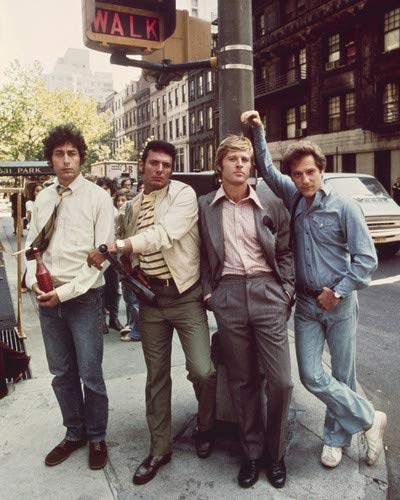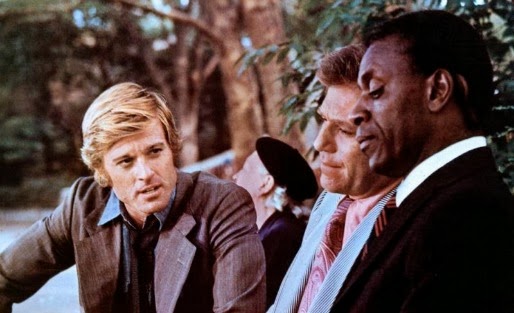Part of my ‘New York State of Mind’ series.
“I’ve heard of the habitual criminal of course, but I never dreamed I’d become involved in the habitual crime.” So speaks one of the droller denizens of The Hot Rock, Peter Yates’ winding caper film, in which a gang of thieves find themselves stealing the same loot over and over again. In a jewel heist, as in comedy, timing is everything.
John Dortmunder (Robert Redford) sees himself as a professional, a man who can’t do anything else but steal. The day he’s released from prison, the warden (Graham Jarvis) stops him to deliver his standard rehabilitation speech. They’ve met many times at many institutions—for a consummate thief, Dortmunder has a knack for getting caught—and Dortmunder assures him that this time, he’s been fully reformed. Then the warden asks for an honest answer and Dortmunder admits, calmly and without malice, that he could go straight, “but my heart just wouldn’t be in it”. On the outside, he’s met by his brother-in-law, Andy Kelp (George Segal), who has a job for him. Dr. Amusa (Moses Gunn), a diplomat representing an unnamed African nation, wants to acquire a large diamond which once belonged to his country, before it was stolen during the colonial era, reclaimed and then stolen again by greedy neighbours. The diamond is now on display at the Brooklyn Museum. Amusa will happily pay Dortmunder to steal it.
Dortmunder is wary of amateurs in general and Amusa in particular, but Kelp wheedles him into accepting. Besides, the job is too much of a challenge to resist. Dortmunder recruits a driver, Stan Murch (Ron Leibman) and an explosives expert, Alan Greenberg (Paul Sand), and together they pull off an elaborate heist which, despite all of Dortmunder’s careful planning, rapidly goes off the rails. They steal the diamond, only to have to steal it again. And again. And again.
Watching The Hot Rock is like spending time with that boy at the back of the class who’s always staring out of the window, his head full of fantastical schemes. William Goldman’s script, based on Donald E. Westlake’s novel of the same name, meanders from one absurdity to the next as Dortmunder grapples with incompetent colleagues, an impatient backer and the ‘hot rock’ itself—a diamond which refuses to stay put. Kelp insists his brother-in-law is talented and Dortmunder does appear to have a gift: his gambits are intricately planned and, to Amusa’s dismay, increasingly expensive. Nothing should go wrong, yet something invariably does. The Hot Rock is a drily funny, off-kilter caper film in which the caper never ends.
None of it would work without Redford. Dortmunder is a stoic of sorts; Redford speaks deliberately, with a deadpan so measured the audience wonders if Dortmunder himself knows how often he’s funny. During the museum heist, Kelp abruptly falls apart, forcing his brother-in-law to restore his confidence with a pep talk about Kelp’s “legendary hands”, nonsense Kelp swallows whole. Redford miraculously delivers it with a straight face. As a concatenation of circumstances keeps the diamond just out of reach, Dortmunder grows defiant, adamant that the rock that has jinxed him won’t beat him. Redford makes his dogged persistence hilarious and endearing.
Dortmunder plays straight man to a crew of eccentrics. Ron Leibman is gleefully unhinged as Murch, a mechanic who is such a gearhead, he and his mother treat a record of roaring engines and screeching tyres with the same attention others would show a concerto. Kelp doesn’t have to steal (he has a flourishing business as a locksmith) but he desperately wants to—for the adrenaline rush and for the honour of working with Dortmunder, whom he idolizes. George Segal strikes just the right balance between optimism and idiocy. Paul Sand enjoys himself as Greenberg, an oddball who learnt most of his trade on the barricades at Berkeley and the Sorbonne. “You must have enjoyed education,” Dortmunder says, wryly. “Yes, I loved school,” he replies, without irony. Gunn makes the most of Amusa, whose mordant response to new complications becomes a running gag. Just when the film seems to have settled into a groove, Zero Mostel bursts in as Greenberg’s father, with enough bombast to bamboozle half of Manhattan.
The Hot Rock did poorly at the box office and I can’t understand why. The film is a deadpan riot, a tightly-plotted caper that feels loose-limbed, filled with great performances and backed by a free-wheeling Quincy Jones score that positively oozes cool. (Just listen to the opening drum break.) It’s an underseen gem.


That pictures says it all! I think it aptly resumes what you have written. I haven’t watched ‘The Hot Rock’ but I completely believe you when you say it is “like spending time with that boy at the back of the class…”.
Thank you!